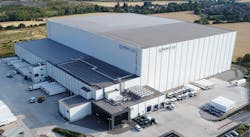NewCold growing again with new deepfreeze facility in United Kingdom
Automated cold storage specialist NewCold says it is opening a new deepfreeze facility in October in Corby, Northamptonshire, England, in response to demand from the food manufacturing sector.
The company said its expects to see the first pallets arriving within one year.
Based on the energy-saving sustainable formula integral to the success of the group’s existing sites, the Corby facility sits on a 23-acre plot, which is a prime location in the logistics ‘golden triangle,’ according to Country Director Jon Miles, with proximity to frozen distribution centers of large retail and food service customers.
The new location will enable NewCold customers to reduce food miles and cut costs, NewCold said.
“Since opening our first UK site in Wakefield five years ago, we have seen an increase in demand for our warehouse and transport services of over 150%,” Miles explained. “And although the Wakefield plant is the largest of its kind in the country, handling 4 million pallets annually and storing 143,000 at any given time, demand has outstripped supply.”
The Corby site gives NewCold another facility farther south in the UK, enhancing services for customers who weren’t receiving added value from the Wakefield location geographically. Miles says the Croby site is ideally located to support frozen food manufacturers and importers looking to boost supply chain value.
“Furthermore, with a focus on sustainability at both the Wakefield and Corby sites, our unique cold store design, which uses around 50% less energy than conventional stores, coupled with our ability to reduce food miles by using high-volume trailers, will greatly reduce CO2 emissions and energy use,” Miles added.
NewCold said it is looking to add “high-volume potential customers” to its group of Wakefield customers, which includes McCain, Aunt Bessie, Birds Eye, Froneri, Finsbury and Grupo Bimbo.
“The decision to build a second facility has been driven by an increasing wide-scale demand for storage and handling, while the number of deep-frozen storage facilities has reduced,” Miles concluded. “This has seen cold stores at capacity during certain times over the last two years and the trend appears to be continuing, so we feel this is the right time to invest.”
